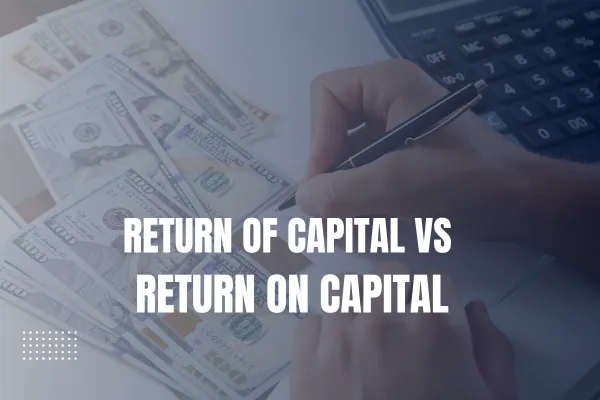Investment Articles
Our Mission to Changes Lives and Create Generational Wealth through Real Estate Investing!
From Finance

Return of Capital Vs. Return on Capital
What Every Investor Should Know About Capital Returns
Investing is the process of allocating capital—money used to purchase assets—with the goal of generating income or appreciation. When done strategically, investing can create additional income streams, build wealth, and provide financial freedom.
In Real Estate Private Equity, capital plays a critical role in acquiring and improving properties and understanding how investors receive returns is essential. Two key concepts in this process are Return OF Capital and Return ON Capital. Though they
may sound similar, they have distinct implications for investors, cash flow, and taxation.
What Is Capital Investing in Real Estate Private Equity?
Capital, in the context of investing, refers to the money used to acquire an asset. In a real estate Private Equity, investors contribute capital to purchasing a property, which is then managed by General Partners (GPs) who execute a business plan to increase its value and profitability.
Throughout the investment lifecycle, investors receive distributions. However, it’s
important to differentiate between:
Return ON Capital – Periodic cash flow (profit) from the property’s operations and appreciation-based profits at exit.
Return OF Capital – The repayment of the investor’s original capital, which typically occurs only at the exit (sale or refinance).
Return OF Capital: Getting Your Investment Back
Return OF Capital refers to the repayment of an investor’s original principal contribution and typically occurs only when the property is sold or refinanced. This ensures investors first recoup their investment before receiving additional profits.
How It Works in a Real Estate Private Equity:
The property is held and improved while investors receive cash flow distributions categorized as return ON capital.
At the sale or refinance, investors receive their full original investment back first as a return OF capital.
Any remaining profits from appreciation are distributed as an additional return ON capital.
Key Takeaways:
Occurs at the exit (sale or refinance), not during the hold period.
Not taxable, as it represents the return of the investor’s own money.
Ensures investors recoup their initial capital before profits are distributed.
Return ON Capital: Cash Flow + Appreciation Gains
Return ON Capital represents the income and profits investors earn on their initial
investment. In Real Estate Private Equity, this comes from:
Cash flow distributions (during the hold period) from rental income.
Profits from appreciation (at the exit) when the property is sold for a higher value than the original purchase price.
How It Works in a Real Estate Private Equity:
Investors contribute capital (e.g., $50,000).
Throughout the hold period, they receive cash flow distributions (e.g., 7% per year).
The property appreciates in value due to operational improvements and market growth.
Upon sale, the increased equity is distributed as an additional return ON capital before the initial investment is repaid.
Key Takeaways:
Includes cash flow from rental operations and profit from appreciation.
Distributed periodically (cash flow) and in a lump sum at the exit (sale profits).
Taxable income (though often offset by depreciation and long-term capital gains treatment).
Conclusion
In real estate private equity, investors typically receive cash flow as return ON capital during the hold period and a large return ON capital distribution from appreciation at exit, followed by the full return OF capital.
By understanding these distinctions, investors can properly evaluate Private Equity returns and taxation implications, ensuring they make informed investment decisions.
Next Steps:
Whether you’re a seasoned investor or new to investing, Let’s work together to achieve your financial goals. Schedule a Call Now
Disclaimer
The content within these articles is not intended to provide, nor should it be construed as providing, tax, investment, or legal advice. You should consult your own professional advisors before making any decisions. These articles and emails are for informational purposes only.
Investment Articles

Return of Capital Vs. Return on Capital
What Every Investor Should Know About Capital Returns
Investing is the process of allocating capital—money used to purchase assets—with the goal of generating income or appreciation. When done strategically, investing can create additional income streams, build wealth, and provide financial freedom.
In Real Estate Private Equity, capital plays a critical role in acquiring and improving properties and understanding how investors receive returns is essential. Two key concepts in this process are Return OF Capital and Return ON Capital. Though they
may sound similar, they have distinct implications for investors, cash flow, and taxation.
What Is Capital Investing in Real Estate Private Equity?
Capital, in the context of investing, refers to the money used to acquire an asset. In a real estate Private Equity, investors contribute capital to purchasing a property, which is then managed by General Partners (GPs) who execute a business plan to increase its value and profitability.
Throughout the investment lifecycle, investors receive distributions. However, it’s
important to differentiate between:
Return ON Capital – Periodic cash flow (profit) from the property’s operations and appreciation-based profits at exit.
Return OF Capital – The repayment of the investor’s original capital, which typically occurs only at the exit (sale or refinance).
Return OF Capital: Getting Your Investment Back
Return OF Capital refers to the repayment of an investor’s original principal contribution and typically occurs only when the property is sold or refinanced. This ensures investors first recoup their investment before receiving additional profits.
How It Works in a Real Estate Private Equity:
The property is held and improved while investors receive cash flow distributions categorized as return ON capital.
At the sale or refinance, investors receive their full original investment back first as a return OF capital.
Any remaining profits from appreciation are distributed as an additional return ON capital.
Key Takeaways:
Occurs at the exit (sale or refinance), not during the hold period.
Not taxable, as it represents the return of the investor’s own money.
Ensures investors recoup their initial capital before profits are distributed.
Return ON Capital: Cash Flow + Appreciation Gains
Return ON Capital represents the income and profits investors earn on their initial
investment. In Real Estate Private Equity, this comes from:
Cash flow distributions (during the hold period) from rental income.
Profits from appreciation (at the exit) when the property is sold for a higher value than the original purchase price.
How It Works in a Real Estate Private Equity:
Investors contribute capital (e.g., $50,000).
Throughout the hold period, they receive cash flow distributions (e.g., 7% per year).
The property appreciates in value due to operational improvements and market growth.
Upon sale, the increased equity is distributed as an additional return ON capital before the initial investment is repaid.
Key Takeaways:
Includes cash flow from rental operations and profit from appreciation.
Distributed periodically (cash flow) and in a lump sum at the exit (sale profits).
Taxable income (though often offset by depreciation and long-term capital gains treatment).
Conclusion
In real estate private equity, investors typically receive cash flow as return ON capital during the hold period and a large return ON capital distribution from appreciation at exit, followed by the full return OF capital.
By understanding these distinctions, investors can properly evaluate Private Equity returns and taxation implications, ensuring they make informed investment decisions.
Next Steps:
Whether you’re a seasoned investor or new to investing, Let’s work together to achieve your financial goals. Schedule a Call Now
Disclaimer
The content within these articles is not intended to provide, nor should it be construed as providing, tax, investment, or legal advice. You should consult your own professional advisors before making any decisions. These articles and emails are for informational purposes only.

Copyright © 2025 Aries Capital Investments. All rights reserved.
